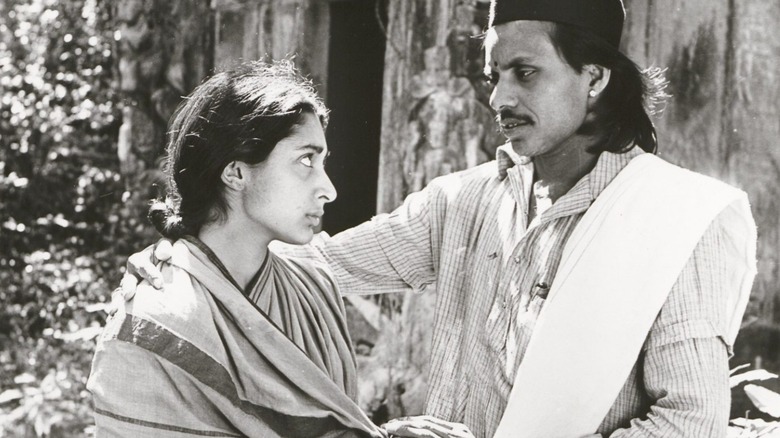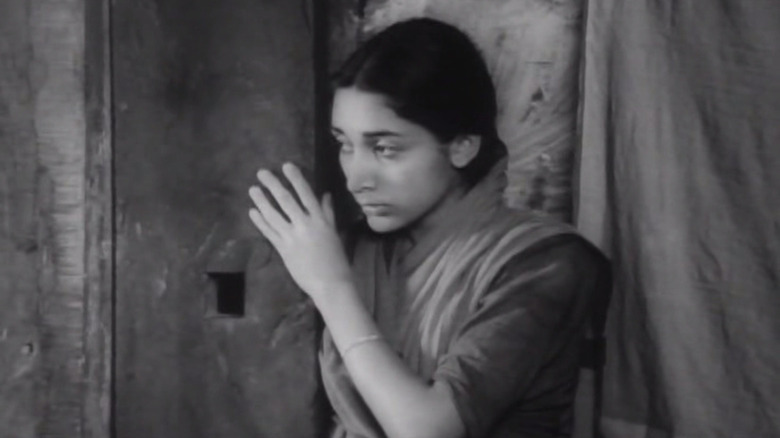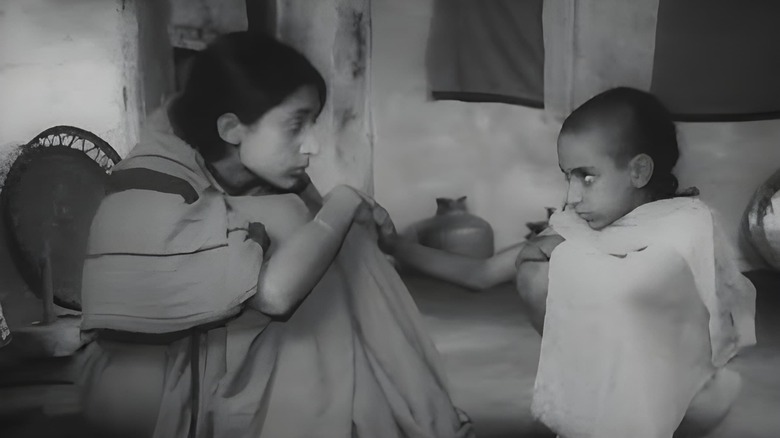The Groundbreaking Indian Film Martin Scorsese & George Lucas Are Trying To Save
The title of Girish Kasaravalli's 1977 film "Ghatashraddha" is directly translated as "The Ritual," although the on-screen English title is "Ritual of Excommunication." Both titles reflect the bleak circumstances of the film's protagonist, even though "The Ritual" implies that women are abused and discarded as a matter of course. "Ghatashraddha" is a bleak tragedy about a woman named Yamuna (Meena Kuttappa) who lives with her religious schoolteacher father (Ramaswamy Iyengar) and who is already a widow at a young age. Yamuna is already seeing another man, also a schoolteacher, although their affair is secret ... as is her pregnancy. The only person who treats Yamuna with any friendliness is a young boy named Naani (Ajith Kumar), who serves as a witness to the story.
When her father goes out of town to raise money for his school, everything falls apart. The school deteriorates, gossip begins to spread, and Yamuna becomes an outcast. She is forced to an abortion clinic, is kicked out of the village, and, when her father returns, shaved and abandoned under a tree.
Not too many Kannada-language films make their way to North America, so Kasaravalli may be obscure outside of the international film community. That said, it's important to know that "Ghatashraddha" was considered to be a striking and notable debut back in 1977 and won the National Film Award (sort of the Indian Oscars), an honor that Kasaravalli would win three additional times.
Variety has reported that "Ghatashraddha" is slated to undergo a massive restoration at the hands of the Film Heritage Foundation, an Indian archiving and restoration enclave devoted to cinema history. The Foundation will receive support from Martin Scorsese's invaluable World Cinema Project, with funding from the Hobson/Lucas Family Foundation run by George Lucas.
Ghatashraddah
According to Variety, the restoration will take place in Italy at L'Immagine Ritrovata, a highly respected specialized restoration laboratory. The restoration will be taken from an original camera negative that was being stored in an Indian archive. As one can see by the photos included in this article, the current state of the film's visual fidelity is a little unkempt.
At the Rotterdam International Film Festival, Kasaravalli was present for the announcement that "Ghatashraddha" would be restored, and he gave a formal thanks to the World Cinema Project (as well as the foundations that made the restoration possible):
"The fact that my film has been selected for restoration by none other than these doyens among filmmakers, is a matter of pride and great honor. I am thankful to Mr. Scorsese and World Cinema Project and Mr. George Lucas and Mrs. Mellody Hobson and Hobson/Lucas Family Foundation. I would also like to give my sincere thanks to Mr. Shivendra Singh Dungarpur of Film Heritage Foundation who not only did put forward the proposal for restoration but also pursued it to its logical conclusion."
The restoration of "Ghatashraddha" will be a long and painstaking process, and the restorers hope to be done with the film in time for the 50th anniversary of its original release in 2027. Yes, film restorations can indeed take that long, as every single frame needs to be studied and repaired. You can visit the L'Immagine Ritrovata website to see some of its awesome-looking restoration equipment.
The World Cinema Project
For those who may be unfamiliar, Scorsese's World Cinema Project was founded in 2007 as a means to find, restore, and present valuable movies from all over the globe. One might have seen the fruits of Scorsese's labor appear in the form of four amazing Blu-ray box sets available through the Criterion Collection. In those boxes, one can see pristine versions of previously obscure, lost, or difficult-to-find masterworks like Djibril Diop Mambéty's "Touki Bouki," Lino Brock's "Insiang," Apichatpong Weerasethakul's "Mysterious Objects at Noon," Edward Yang's Taipei Story," Héctor Babenco's "Pixote," and many others. If you haven't heard of these movies, consider Scorsese's efforts to restore and present them as the ultimate recommendation. You may discover some of the best cinema ever produced.
The World Cinema Project has restored other notable international classics besides, including films from Angola, Burkina Faso, Côte d'Ivoire, Egypt, Mauritania, Senegal, the Philippines, and the Soviet Union. One can tour the entire world through cinema and the World Cinema Project is the best passport for doing so.
As reported by Variety, the World Cinema Project also worked with India's Film Heritage Foundation to restore "Kummatty" (1979) and "Thamp̄" (1978), two Malayalam-language films by filmmaker Aravindan Govindan. Never let it be said that Scorsese isn't always digging deep to find the best movies imaginable.


